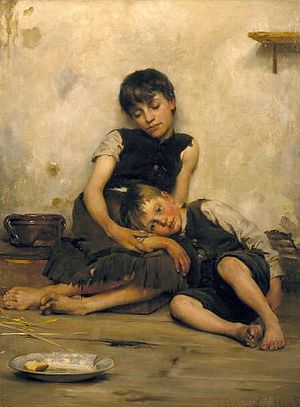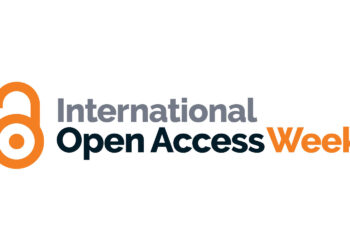Would we care about orphan works so much if we did not call them orphans?
The “orphan works problem” refers to the large group of books published after 1923 (in the U.S.) whose copyright status cannot easily be determined. (Books published before 1923 are in the public domain.) It’s a problem because no one knows what can be done with these books. Can they be republished? Digitized and mounted on a Web server? Substantially rewritten (which you can do with a public domain text)? A second-order problem is that it is a huge pain to figure out the copyright status for many of these works. Books go out of print, authors die, publishers go under or are acquired by other companies. Someone may control the rights to a dozen of Grandpa’s books and not know it. Copyright law is the only thing I know of that is more complicated than the U.S. tax code.
Google’s mass digitization project brought orphan works into prominence, as Google proposed to scan them without first hacking through the copyright thicket. It’s an article of faith among many that rescuing the orphans from obscurity would enrich the world, and perhaps it would. Google is thus either a good guy (for saving the orphans) or a bad guy (for stealing the orphans from the public). It’s worth sitting down with some of the orphans themselves and asking them how they feel about this.
First, we should clarify some terms, which are oddly confused at times in discussions of orphan works. An orphan is a book of uncertain copyright status. This is not the same thing as a book that is out of print, with which orphans are sometimes conflated. Putting aside the historical irony of the phrase “out of print” (OP) in a world that is rapidly becoming digital, a book that is OP may have a clear copyright status. It may be OP for a reason having nothing to do with copyright, and that reason is most likely to be that the copyright holder believes that there is insufficient market demand for the book to make it worthwhile to offer it to the public. (Since we do live in a digital age, the effort may not literally be to print the book but to scan it and make it available as an ebook or through print-on-demand, which involves a certain amount of investment that may exceed the sales potential.) If, on the other hand, the copyright holder believed that there was indeed a customer base of sufficient size, the book would experience the Rapture of demand and be swept back into the marketplace.
Copyright holders may have other reasons for keeping books out of the marketplace, of course. Grandpa may have written an embarrassing memoir, and his heirs may choose to forego the income from sales in order to keep the family’s story out of general circulation. But this would be an exceptional case. There is a reason that books go OP, and that reason almost always has nothing to do with copyright and everything to do with straightforward economics.
Nor are orphans the same thing as backlist. Definitions of “backlist” vary among publishers, but generally a title is frontlist if it was published in the current year or perhaps in the last two years, and backlist if it was published before then. Just about all the profit of the book business comes from backlist (which typically carries a gross margin of 40% to 60%, depending on whether they are trade or professional titles), so astute publishers treat these titles royally and not as orphans, often investing in revisions, new packaging, and special promotions. Here it should be noted that books and journals are complete opposites in this respect: journals make most of their money with new titles and books from old ones.
I sat down with one orphan that had been Left Behind and got his story. He is a biograpy of Abraham Lincoln, not the first, and far from being the last. He was published in the 1930s (he isn’t sure of the exact date). There was a print run of a few thousand copies, few of which ever left the warehouse. After a few years, his guardian gave up on him, pulped the remaining stock, and moved on to other things. “It was a hard, short life,” he told me. “But I did come to terms with the fact that about the time I was published, there appeared another book on Lincoln. It was much more comprehensive and, I regret to say, more stylishly written. I was disappointed with my fate, but I cannot say I was treated unfairly. Now I see that books on Lincoln could fill a large building. It’s hard to see why anyone would bother with me with so much else to choose from.” I’ve offered to help this book find a place in a workshop on self-esteem.
Less sympathetic is the orphan Left Behind who had in fact sold a reasonable number of copies in the 1940s. A romance novel set in prerevolutionary Spain, this orphan is a confection of love, betrayal, wealth, adventure, wealth, good looks, and a car crash. It rose and fell swiftly. It makes no claims to literature, nor expresses any interest in the workings of copyright law. She is bitter and, like the heroine of her story, feels betrayed. “Scan me and watch me jump back into action! Janet Dailey, get out of my way!” Alas, no one heard her plea, as her readers were fully occupied with the hundreds of new romances, many of them published digitally, some of which would also disappear from the stage in a matter on months.
As there are thousand of orphans, it is impossible to speak with them all. They include the critical essays on Keats and Shelly, read in their time and absorbed into later works; fiction, mountains of fiction, anchored in once-popular myths that now look like an old dress or a pair of Grandma’s shoes; medical texts prescribing drugs no longer in circulation; and books on diet that recommend smoking to keep off those unwelcome pounds. We call them orphans because we care, but when we look at them carefully, we find that we do not care. Books are Left Behind for a reason.
With digital technology, that reason may not be as strong as it once was. Most orphans disappeared from the marketplace in the age of letterpress and linotype; it was uneconomical to print and distribute small quantities to satisfy what limited demand there may have been; thus these titles first went out of print and then, neglected, slipped into orphan status as copyright records were misplaced. With digital printing it takes a small amount of money to restore a book, making the market requirements for supporting a title very low indeed.
But small demand is infinitely greater than no demand, and it seems probable that most orphans would have no demand at all. This is an extrapolation from books that are in fact in print and available from their publishers, whether in print or digital form. Many academic presses report that fully half of their books in print have had no sales activity in the past year, and many libraries report that 40% of the books in their collections have never circulated. It seems a stretch to assert that books that have been Left Behind are more likely to find an audience than books that ever-optimistic publishers have kept in inventory.
There are two challenges to this analysis. First, orphan works that are digitized would be accessible to full-text search, thereby generating demand from enhanced discovery. This is true; I would be astonished if full-text search did not generate some interest in orphans. But this would be true as well of the thousands of books that are in print and available for full-text search, many of which continue to generate no interest among readers; it’s difficult to see why books that have been orphaned by publishers would be more popular than titles publishers continue to have hopes for. In any event, it is not necessary to test this hypothesis by digitizing all the books in the world; this could be examined by taking a sliver of the titles from the shelves of libraries — all works in political science, say, or every book catalogued under American history. It is truly strange that the hypothesis concerning orphan works — that they await only the magic of digital technology to release them into a world of readership — should be accepted on faith alone. But that is why it is called the Rapture.
The second reason that this analysis may be incorrect is that the Rapture of demand applies only to books to be read by humans. Machines are indiscriminate. One intriguing aspect of the aborted Google books settlement is that the digitized books were to be made available for research to improve computer search technology. This item has not been much discussed in the massive media coverage of Google’s digitization project, but it may be that data-miners find value in every enlargement of the databases they search. Is it significant that Google cofounder Sergey Brin was studying data-mining as a graduate student at Stanford? Still, it is an odd choice of metaphor to use the term “orphan” for a book that is to be adopted by a machine.
It’s ironic that even as the discussion of orphan works takes books out of the realm of demand and puts them into a spiritual state where they are deemed to have value in the absence of readership, demand is very much on the minds of librarians today as they begin to introduce patron-driven acquisition (PDA) to collection-building. With PDA, libraries purchase books only when users actually request them, which will increase the utilization rate of library collections. Thus the future of collections is in the direction of demand, but the past of collections is being measured without regard to demand. The future and the past pull in opposite directions, with more investment being made in what has gone before than in what is yet to come.
Advocates of mass digitization to solve the orphan works situation are in a very good position, as they really can’t lose. The project will proceed without testing or accountability, stoppable only be litigation — and for what end litigation, when the books in question have no apparent economic value? Even if nothing is done to rescue orphans, the problem shrinks, relatively speaking, over time. This is because the number of new books continues to grow, but the number of orphans is finite. The orphan works problem is thus a small and diminishing one; we don’t have to lift a finger to watch it shrink proportionately. We would do well to focus instead on the sheer fecundity of the human imagination and all the books to be written when orphan books and mass digitization are long forgotten.
Having said this, I am myself in favor of legislation to solve the orphan problem if only to move beyond it. My preferred solution is to impose a nominal tax (say, $50 per book-length work per year) to retain copyright in a work after a brief initial period (perhaps 14 years). Anyone who claims title to a copyright would have to step up and pay to keep the rights to the book; any title for which the fee is not paid would fall into the public domain. This would end the orphan works problem instantly, as few people would pay the tax for a book with no economic value. Publishers would oppose this legislation, but they shouldn’t. An inflexible position on copyright brings about determined opposition, which could fight to overturn the entire copyright regime. Take Google, for example.
Discussion
7 Thoughts on "The Rapture of Demand — Caring for Orphan Works Left Behind"
I am in strong agreement with your notion that there will be little interest in the vast majority of orphan works. The Congressional Research Service has estimated that just 2 percent of copyrighted works that are 55 to 75 years old retain any commercial value (https://www.nytimes.com/2008/05/20/opinion/20lessig.html). That said, there is likely value to be found in a small percentage of the works, and it is impossible to pre-filter out that value and only address the interesting part of the literature. Dismissing all orphan works means throwing out the small amount of good with all of the useless.
It’s kind of like the argument that there’s too much science being published these days. Yes, there is a lot of mediocre science that isn’t going to go anywhere, but you can’t predict with certainty in advance which research will later prove valuable, hence it’s better to do it all and see how things sort out.
There’s also, as you point out, valuable historical data to be reaped from studying the literature of a given time period. Google’s NGrams are an example (http://ngrams.googlelabs.com/).
Your proposal for dealing with orphan works is essentially Lawrence Lessig’s plan from a few years ago (described in the link above), albeit with the prices raised quite a bit. Lessig proposed reforming copyright for all works, including new ones. You publish a work, and you get an initial copyright period of 14 years (all works published before the reform get that same initial 14 year protection). Then after that, you must register your continuing copyright and pay a nominal fee, $1 (renewable every 10 years thereafter). Everything not registered goes into the public domain. This creates a registry of works in copyright and lets anyone exploiting a work continue to earn from the value it holds.
The failed Public Domain Enhancement Act from 2003 (https://secure.wikimedia.org/wikipedia/en/wiki/Public_Domain_Enhancement_Act) was similar in its nature.
What did the CRS consider to be the criterion of “commercial value”? Since, as Joe points out, what was uneconomical in an age of offset printing is not so in an age of digital printing, a very low sale can constitute commercial value. in our Metalmark series at Penn State Press, it took only about 10 copies sold to recover full costs of republishing these public-domain books.
On Joe’s (and Lessig’s) proposal, I suspect a legal stumbling block is the Berne Convention, which prohibits any formalities as a condition of obtaining copyright protection (and which is the reason that, after 1989, the copyright notice and other such formalities were done away with).
I want data he croaked. You ask why? Here’s why.
Wanting data vs. wanting orphan works is an important distinction. When we discuss commercial value of works, we’re looking at the value of the works themselves, or perhaps of derivative works (the movie based on the book!). When you look at these works as data–when you mine them in whatever way for whatever reason–you’re making a transformative, and fair, use of them.
Value in the absence of readership is possible, but that value is created by transformation.
As has been commented in these very pages before (http://scholarlykitchen.sspnet.org/2011/03/14/the-terrible-price-of-free-on-e-reading-jane-austen-via-googles-ebooks/) Google Books is a lousy “place” to get a book to read, that is, to get a good (“Fair,” text critics might say) copy of a book. But it’s a great–no, it’s the best so far–place to get as many books as possible, for purposes other than reading one of them. That is to day, for transforming them into something else entirely.
“An orphan is a book of uncertain copyright status.” Wrong. An orphan work is a book protected by copyright but whose copyright owner cannot be located, either because the current owner cannot be identified or, if known, cannot be found. Your 1930 biography of Lincoln, assuming it was published in the US, most likely did not have its copyright renewed and hence is in the public domain.
Thoughtful article, Joe. Just a few comments.
Years ago I was an acquisitions editor, which means I worked for a publishing company reading book proposals from authors and agents, thinking up new book ideas, and searching for authors to write great books. When deciding whether to take a book out of print, its economics were always a factor. But often there was what you call a “spritual” factor. If the economics were marginal, and especially if the author could use material from the book in her business or ongoing research, we took the book out of print and offered to revert all rights to the author. We were not legally obligated to do this but felt it was fair.
I don’t agree with the conclusion of your article in which you state, “Publishers would oppose this legislation, but they shouldn’t. An inflexible position on copyright brings about determined opposition, which could fight to overturn the entire copyright regime.” First, I know from experiences like the one mentioned above, publishers are not always inflexible. Second, not doing the right thing because you expect opposition is not ethically defensible. Taking a difficult but principled stand has led to some reasonably good things like abolishment of slavery, voting rights for women, and the USA.




